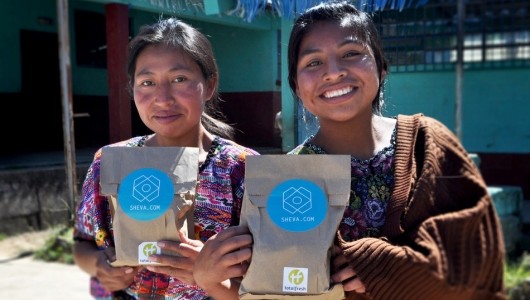How the SHEVA Company is Helping Girls Stay in School

In developing countries, girls often miss school or drop out entirely when they begin menstruating. Many are reluctant to tackle this issue because of the taboo that still surrounds menstruation, but it is a widespread problem that affects the education of millions of girls worldwide. In India, girls’ schools often lack functioning toilets, and in Burkina Faso and Niger, there are usually no places at schools for girls to change sanitary pads or dispose of waste. In Ghana, inadequate sanitation facilities, lack of access to sanitary products and physical discomforts related to menstruation, such as cramps, cause girls to miss an average of five days of school over the course of any given month.
Girls who drop out of school continue to struggle throughout their lives. They are more likely to marry and engage in sexual activity earlier. Because they are also less likely to use contraception, they typically have more children than girls who complete their schooling. This can trap them in the cycle of poverty. When girls miss school because of menstruation, they are held back from many opportunities by a completely natural physical process that should never have to interfere with their education.
That’s why SHEVA, a company launched in October 2014 by Marisabel Ruiz, is currently working in Guatemala to provide girls with sanitary hygiene products. Ruiz, who was born in Guatemala, decided to start these efforts in her native country because she already had connections there that could help SHEVA to reach more girls. Women can go to SHEVA’s website to purchase a variety of products, such as pads from familiar brands like Kotex and Playtex, or other items related to sexual health like condoms and pregnancy tests. With every purchase, SHEVA donates a month’s supply of sanitary pads to a girl in need.
SHEVA has also partnered with the organization Abriendo Oportunidades to provide health education to girls. They have created a two-year program that primarily focuses on what menstruation is, personal hygiene and women’s rights.
So far, SHEVA has provided sanitary pads to 300 girls, and 25 girls have enrolled in the educational program. A total of 5 million people have accessed free educational information on their website. Their next goal is to teach girls to make sanitary pads on their own, using biodegradable, locally available materials such as banana fibers.
Currently, only people in the U.S. can order from SHEVA’s website, but they plan to expand both their shipping and on-the-ground services to other countries in order to help as many girls as possible. SHEVA’s support for girls has helped them continue pursuing their education and has taught many that menstruation is nothing to be ashamed of.
– Jane Harkness
Sources: Girl Effect, Mashable, Menstrual Hygiene Day, SHEVA
